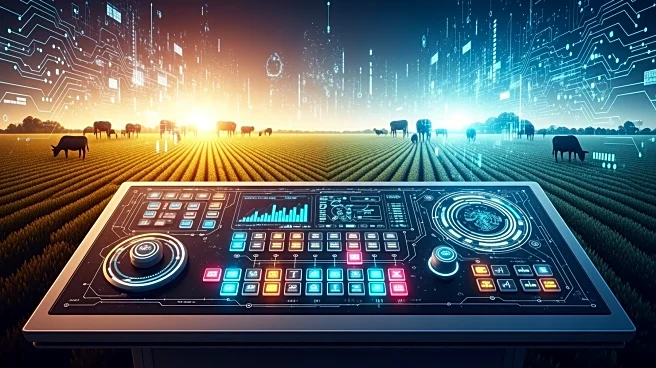What's Happening?
The FAO Science and Innovation Forum 2025, a significant component of the World Food Forum, commenced with a call from QU Dongyu, Director-General of the Food and Agriculture Organization of the United Nations (FAO), for enhanced global collaboration
to transform agrifood systems through science, technology, and innovation. The forum, running from October 13 to 17, gathers scientists, policymakers, youth, Indigenous Peoples, civil society, and the private sector to discuss inclusive solutions to global agrifood challenges. QU emphasized the importance of science and innovation as tangible actions, embodied in technologies like satellites, sensors, data, and trustworthy Artificial Intelligence, which provide real-world solutions when utilized effectively. The forum aims to demonstrate how inclusive and evidence-based innovation can convert shared challenges into opportunities for transformation.
Why It's Important?
The FAO Science and Innovation Forum 2025 is crucial as it addresses the pressing need for transformation in agrifood systems, which are vital for global food security and sustainable development. By fostering collaboration among diverse stakeholders, the forum seeks to bridge gaps in science, technology, and innovation, ensuring that advancements are accessible and affordable to all. This initiative supports FAO's Strategic Framework 2022-31, aiming for agrifood systems that are more efficient, inclusive, resilient, and sustainable. The forum's focus on innovation highlights the potential for technology to empower farmers, fishers, herders, entrepreneurs, women, and youth, enabling them to create solutions tailored to their contexts. The event underscores the importance of aligning policy, finance, and markets to responsibly support innovation and community-driven change.
What's Next?
Throughout the week, the Science and Innovation Forum 2025 will feature thematic dialogues, regional events, exhibitions, hackathons, and innovation pitches showcasing breakthrough research and new models of collaboration. Participants are encouraged to make commitments to apply evidence-based science, close the innovation gap, and partner for scale. The forum aims to catalyze change by demonstrating how inclusive and evidence-based innovation can transform agrifood systems. FAO's initiatives, such as Hand-in-Hand, 1000 Digital Villages, and One Country-One Product, will be highlighted as examples of co-created and scalable solutions. The outcomes of the forum are expected to influence future policies and strategies in agrifood systems globally.
Beyond the Headlines
The forum's emphasis on inclusive innovation raises important ethical considerations regarding the equitable distribution of technological advancements. Ensuring that innovations are accessible to marginalized communities and integrating Indigenous knowledge with modern tools are critical for achieving sustainable development goals. The event also highlights the cultural dimension of agrifood systems, recognizing the role of local wisdom and community-driven solutions in fostering resilience and sustainability. The long-term impact of the forum could lead to shifts in global agrifood policies, promoting a more collaborative and inclusive approach to addressing food security challenges.














